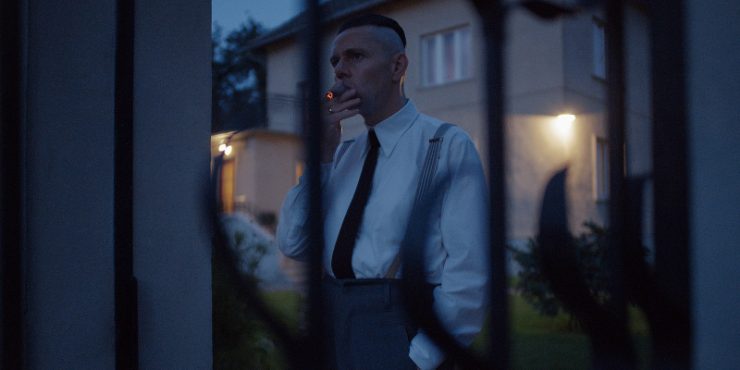The question of depiction in Holocaust films will always be controversial in a way that has nothing really to do with movies. How does one find the balance of evoking the level of monstrosity without exploiting the images of the victims? Jonathan Glazer’s The Zone of Interest takes a chilling route: we don’t see any actual violence, but the horrors are omnipresent, a sometimes intrusive but oftentimes subtle background to the domestic bliss of the commandant of Auschwitz. The film is based on a novel by the recently deceased Martin Amis, but Glazer’s script scrubs as much of the fiction out as he can. The drama is flattened, the visual aesthetic is still and unbothered. This is not a movie that mines for narrative spectacle. In fact, its lack of a story arc only emphasizes the mundanity with which business was conducted in the world’s most notorious concentration camp.
This is a provocative decision, and one that Glazer doesn’t take lightly. At the root of Zone of Interest is a nauseated understanding of humanity’s ability to aid and abet atrocity while continuing day-to-day life. The central figure here is Rudolf Höss (Christian Friedel), the commandant whose reputation for efficient extermination precedes him. He lives in a house just on the other side of a wall where the camp’s business perpetually churns, giving his home life the constant background noise of faintly heard distress and mayhem. His wife, Hedwig (Sandra Hüller), is head of the domicile, and relishes in showing off the home she’s made, which includes an extensive garden of beautiful flowers, a house with sophisticated indoor heating, a nearby river where the whole family bathes happily, and even a small pool for intimate outdoor relaxation.
This is the bucolic paradise that Hedwig has always dreamed of, and while Rudolf’s job means that he can never fully take advantage of it, he’s happy to provide. There are servants who run the household under Hedwig’s strict supervision. Not Jews, but “local girls” which Hedwig keeps permanently under her thumb with veiled threats and reminders of her husband’s position. Glazer’s camera, constantly still and perfectly framed, covers every inch of the home, filled with so many lights it takes Rudolf a considerable amount of time to turn them all off at the end of the night. The bliss that the Hösses share is purely manufactured, built upon the backs of the prisoners slaughtered on the other side of the wall. Hedwig’s desperation for domesticity is such that she’s able to extinguish any rationality with the mountain of death that is happening just next door.
There is a part of me that thinks that The Zone of Interest is a triumph, especially in its formalist filmmaking which presents visual stasis as its own form of evil. The performances from Hüller and Friedell are remarkably chilly in their intellectual compartmentalization and stern forthrightness. For a movie that wishes to unsettle, Interest is sufficiently disturbing, crafting the image of a docile family that actively coexists with historical tragedy as their next door neighbor. There is another part of me that feels completely off-put by a film that perpetrates a trite narrative gimmick for intellectual points. Glazer’s film lacks sentimentality but it also lacks sincerity, and for its runtime it feels like you are being subjected to a clever game where the goal is to conjure evil with as little effort as possible.
Glazer is a brilliant director, with at least two films – 2004’s Birth and 2013’s Under the Skin – I consider to be masterpieces. The creativity with which he views dread and the world at large is unmatched. There’s something unmooring about Zone of Interest, and perhaps that is the point. It’s examination of the “banality of evil” recalls Joshua Oppenheimer’s phenomenal documentary, The Act of Killing. But Killing was a piece of art that found surreality within its subjects; The Zone of Interest manufactures its own surreality and it uses the Holocaust as its foundation. The film’s ending, which makes a last minute reach for earnest contemplation feels like something from a different movie. The starkness of the aesthetic has too long dried out any opportunity for emotional argument.
Of course, the aesthetic of this movie may be the thing about it that works the most, which is part of the problem, especially. Perhaps current events have robbed this film of its cinematic zeal. As I watched this film in the comfy confines of Manhattan’s Lincoln Center, one of the world’s largest military in Israel began exacting its own extermination of an entire population of people in Gaza, a conflict that has only metastasized in horror and violence in the months since.. Like Hedwig and Rudolf, the elite of the Western world and mainstream media turn away. And so, perhaps Glazer’s film is prophetic, predicting the repetition of human tolerance for barbarity, as long as our domestic lives remain uninterrupted. I look forward to rewatching this film when my mind is less clouded by the dreary reality of realtime genocide, but for me, this currently feels less like haunting premonition and more like a shallow facsimile.
Written for the Screen and Directed by Jonathan Glazer










